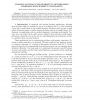Free Online Productivity Tools
i2Speak
i2Symbol
i2OCR
iTex2Img
iWeb2Print
iWeb2Shot
i2Type
iPdf2Split
iPdf2Merge
i2Bopomofo
i2Arabic
i2Style
i2Image
i2PDF
iLatex2Rtf
Sci2ools
139
Voted
SIAMJO
2010
2010
Trading Accuracy for Sparsity in Optimization Problems with Sparsity Constraints
We study the problem of minimizing the expected loss of a linear predictor while constraining its sparsity, i.e., bounding the number of features used by the predictor. While the resulting optimization problem is generally NP-hard, several approximation algorithms are considered. We analyze the performance of these algorithms, focusing on the characterization of the trade-off between accuracy and sparsity of the learned predictor in different scenarios.
Related Content
| Added | 21 May 2011 |
| Updated | 21 May 2011 |
| Type | Journal |
| Year | 2010 |
| Where | SIAMJO |
| Authors | Shai Shalev-Shwartz, Nathan Srebro, Tong Zhang |
Comments (0)

